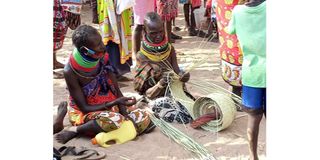How table banking is changing Turkana women's lives

Turkana women weave a mat in Turkwel village, Loima, Turkana County. They have embraced table banking to empower themselves economically.
What you need to know:
- With the support of Joyful Women Organisation, at least 200 groups were formed.
- Women borrow money primarily to meet their household needs by investing in income-generating activities that have ready market.
Women in Turkana County have adopted table banking to promote their financial independence.
Turkana Woman Representative Joyce Emanikor, recently said more than 4,000 women in different groups contribute as low as Sh50. From the savings, they get loans whose interests further boost the kitties.
She noted that with the support of Joyful Women Organisation (Joywo), at least 200 groups were formed, with members borrowing without collateral. The organisation seeks to empower Kenyan women economically and enhance household food security by supporting their involvement in sustainable livelihoods.
“Members borrow from the revolving funds to either start group or individual businesses, with others borrowing to expand their businesses,” Ms Emanikor told Nation.Africa in Lodwar.
Household needs
She noted that women borrow money primarily to meet their household needs by investing in income-generating activities that have ready market.
“The income generated is spent on food, children’s education and hospital expenses, to generally improving their lives,” the legislator explained.
Some rear poultry for sale, others retail cereals and fresh farm produce, while others engage in basketry, beadwork and value addition to livestock products.
Kakwanyang Women Group, for instance, deals in basketry. Members have a ready market in Lodwar. They frequently attend sensitisation meetings where they are trained in entrepreneurship and the benefits of insuring their health and future through the National Hospital Insurance Fund and the National Social Security Fund.
“The women, especially widows, are now economically empowered and able to take care of their families as opposed to when relief food was the only reliable source of survival," the legislator noted.
Ms Emanikor said lack of awareness of critical government support programs had locked out many women, especially in far-flanked areas like Kibish, Todonyang, Kapedo and Lorogon, from exploiting opportunities that resulted from devolution and the national government’s Uwezo Fund.
Covid effects
She, at the same time, called for enhanced support for rural women and youth groups to cushion them against the Covid-19 crisis.
Ms Emanikor said some of the women in basketry and beadwork have yet to recover following the Covid-19 prevention measures that limited their operations.
She said her office has been partnering with different organisations to uplift women and their enterprises.
Mercy Corps under Livestock Market Systems Program’s Rural Entrepreneur Access Program (REAP), she said, has donated motorbikes to groups in Kakwanyang Village in Turkana Central.
"The motorbikes will facilitate women to transport their products to the market, especially Lodwar, in time boosting their income," Ms Emanikor said.





